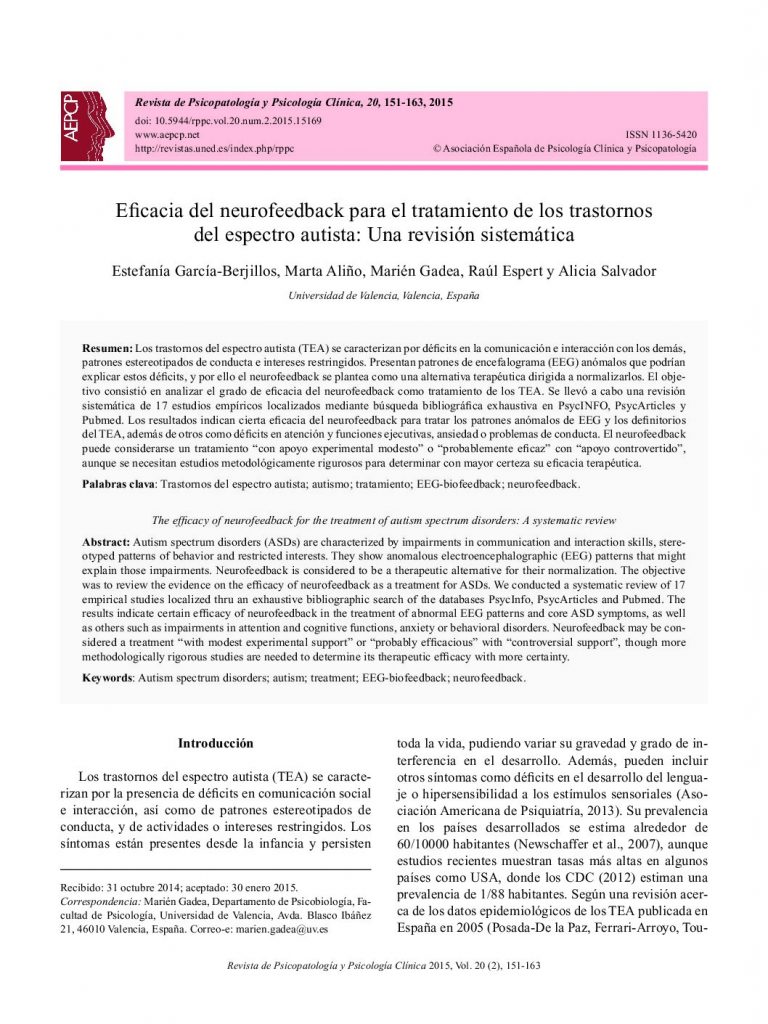Eficacia del tratamiento con neurofeedback para los trastornos del espectro autista: Una revisión sistemática.
Eficacia del tratamiento con neurofeedback para los trastornos del espectro autista: Una revisión sistemática.

- Evaluación de factores cognitivos positivos y negativos relacionados con el trastorno de pánico: Validación del CATP.
- Predictores de recuperación subjetiva en la esquizofrenia.
- Variables de interés clínico en el tratamiento cognitivo-conductual de la adicción a la cocaína: la especificidad de los trastornos de la personalidad.
- Inventario de supresión del pensamiento del “oso blanco” (WBSI): Propiedades psicométricas de la versión portuguesa (Portugal).
- Cuestionario de Observación de la Conducta Bulímica (COBU): Desarrollo de un instrumento para cuidadores de pacientes con bulimia nerviosa.
- Eficacia del tratamiento con neurofeedback para los trastornos del espectro autista: Una revisión sistemática.
- Efectos de la terapia cognitivo-conductual sobre la depresión en personas mayores institucionalizadas.
- Congresos y reuniones científicas 2015.
Autism spectrum disorders (ASDs) are characterized by impairments incommunication and interaction skills, stereotyped patterns of behavior and restricted interests. They show anomalous electroencephalographic (EEG) patterns that might explain those impairments. Neurofeedback is considered to be a therapeutic alternative for their normalization. The objective was to review the evidence on the efficacy of neurofeedback as a treatment for ASDs. We conducted a systematic review of 17 empirical studies localized thru an exhaustive bibliographic search of the databases PsycInfo, PsycArticles and Pubmed. The results indicate certain efficacy of neurofeedback in the treatment of abnormal EEG patterns and core ASD symptoms, as well as others such as impairments in attention and cognitive functions, anxiety or behavioral disorders. Neurofeedback may be considered a treatment “with modest experimental support” or “probably efficacious” with “controversial support”, though more methodologically rigorous studies are needed to determine its therapeutic efficacy with more certainty.
Los trastornos del espectro autista (TEA) se caracterizan por déficits en la comunicación e interacción con los demás, patrones estereotipados de conducta e intereses restringidos. Presentan patrones de encefalograma (EEG) anómalos que podrían explicar estos déficits, y por ello el neurofeedback se plantea como una alternativa terapéutica dirigida a normalizarlos. El objetivo consistió en analizar el grado de eficacia del neurofeedback como tratamiento de los TEA. Se llevó a cabo una revisión sistemática de 17 estudios empíricos localizados mediante búsqueda bibliográfica exhaustiva en PsycINFO, PsycArticles y Pubmed. Los resultados indican cierta eficacia del neurofeedback para tratar los patrones anómalos de EEG y los definitorios del TEA, además de otros como déficits en atención y funciones ejecutivas, ansiedad o problemas de conducta. El neurofeedback puede considerarse un tratamiento “con apoyo experimental modesto” o “probablemente eficaz” con “apoyo controvertido”, aunque se necesitan estudios metodológicamente rigurosos para determinar con mayor certeza su eficacia terapéutica.



